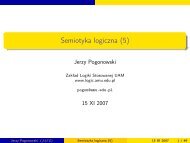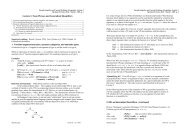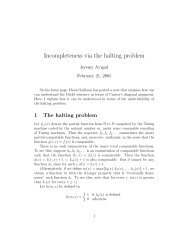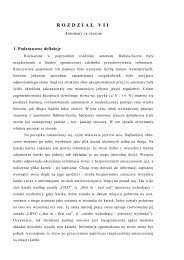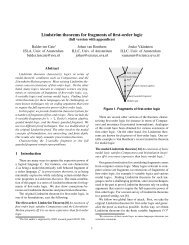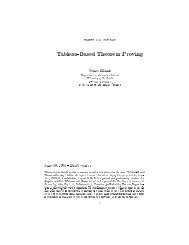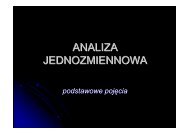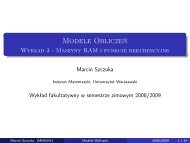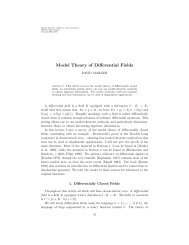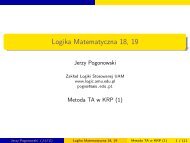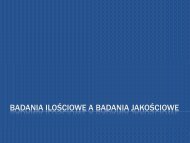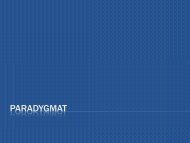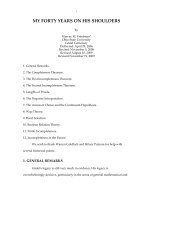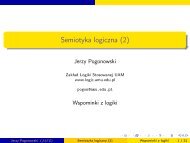MATHEMATICAL MODAL LOGIC: A VIEW OF ITS EVOLUTION
MATHEMATICAL MODAL LOGIC: A VIEW OF ITS EVOLUTION
MATHEMATICAL MODAL LOGIC: A VIEW OF ITS EVOLUTION
You also want an ePaper? Increase the reach of your titles
YUMPU automatically turns print PDFs into web optimized ePapers that Google loves.
98 Robert Goldblatt[Tarski, 1956] Alfred Tarski. Logic, Semantics, Metamathematics: Papers from 1923 to 1938.Oxford University Press, 1956. Translated into English and edited by J. H. Woodger.[Thomas, 1989] Wolfgang Thomas. Computation tree logic and regular ω-languages. In W. P.de Roever J. W. de Bakker and G. Rozenberg, editors, Linear Time, Branching Time, andPartial Order in Logics and Models for Concurrency, volume 354 of Lecture Notes in ComputerScience, pages 690–713. Springer-Verlag, 1989.[Thomason, 1972a] S. K. Thomason. Noncompactness in propositional modal logic. The Journalof Symbolic Logic, 37:716–720, 1972.[Thomason, 1972b] S. K. Thomason. Semantic analysis of tense logic. The Journal of SymbolicLogic, 37:150–158, 1972.[Thomason, 1974a] S. K. Thomason. An incompleteness theorem in modal logic. Theoria,40:30–34, 1974.[Thomason, 1974b] S. K. Thomason. Reduction of tense logic to modal logic, I. The Journal ofSymbolic Logic, 39:549–551, 1974.[Thomason, 1975a] S. K. Thomason. Categories of frames for modal logic. The Journal ofSymbolic Logic, 40:439–442, 1975.[Thomason, 1975b] S. K. Thomason. The logical consequence relation of propositional tenselogic. Zeitschrift für Mathematische Logik und Grundlagen der Mathematik, 21:29–40, 1975.[Thomason, 1975c] S. K. Thomason. Reduction of second-order logic to modal logic. Zeitschriftfür Mathematische Logik und Grundlagen der Mathematik, 21:107–114, 1975.[Thomason, 1975d] S. K. Thomason. Reduction of tense logic to modal logic II. Theoria,41:154–169, 1975.[Tierney, 1972] Myles Tierney. Sheaf theory and the continuum hypothesis. In F. W. Lawvere,editor, Toposes, Algebraic Geometry and Logic, volume 274 of Lecture Notes in Mathematics,pages 13–42. Springer-Verlag, 1972.[Urquhart, 1981] Alasdair Urquhart. Decidability and the finite model property. Journal ofPhilosophical Logic, 10:367–370, 1981.[van Benthem, 1975] J. F. A. K. van Benthem. A note on modal formulas and relational properties.Journal of Symbolic Logic, 40(1):55–58, 1975.[van Benthem, 1976a] J. F. A. K. van Benthem. Modal Correspondence Theory. PhD thesis,University of Amsterdam, 1976.[van Benthem, 1976b] J. F. A. K. van Benthem. Modal formulas are either elementary or notΣ∆-elementary. The Journal of Symbolic Logic, 41:436–438, 1976.[van Benthem, 1978] J. F. A. K. van Benthem. Two simple incomplete modal logics. Theoria,44:25–37, 1978.[van Benthem, 1979] J. F. A. K. van Benthem. Syntactic aspects of modal incompletenesstheorems. Theoria, 45:67–81, 1979.[van Benthem, 1980] J. F. A. K. van Benthem. Some kinds of modal completeness. StudiaLogica, 39:125–141, 1980.[van Benthem, 1983] J. F. A. K. van Benthem. Modal Logic and Classical Logic. Bibliopolis,Naples, 1983.[van Benthem, 1984] J. F. A. K. van Benthem. Correspondence theory. In D. Gabbay andF. Guenthner, editors, Handbook of Philosophical Logic, Volume II: Extensions of ClassicalLogic, pages 167–247. D. Reidel, 1984.[Vardi and Stockmeyer, 1985] Moshe Y. Vardi and Larry Stockmeyer. Improved upper and lowerbounds for modal logics of programs. In Proceedings of the 17th Annual ACM Symposiumon the Theory of Computing, pages 240–251. ACM, 1985.[von Wright, 1951] G. H. von Wright. An Essay in Modal Logic. North-Holland, Amsterdam,1951.[Walukiewicz, 1995] Igor Walukiewicz. Completeness of Kozen’s axiomatisation of the propositionalµ-calculus. In D. Kozen, editor, Proceedings of the Tenth Annual IEEE Symposium onLogic in Computer Science, pages 14–24. IEEE Computer Society Press, 1995.[Walukiewicz, 2000] Igor Walukiewicz. Completeness of Kozen’s axiomatisation of the propositionalµ-calculus. Information and Computation, 157:142–182, 2000.[Winskel, 1985] Glynn Winskel. On powerdomains and modality. Theoretical Computer Science,36:127–137, 1985.[Wolper, 1983] Pierre Wolper. Temporal logic can be more expressive. Information and Control,56:72–99, 1983.



